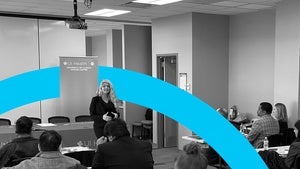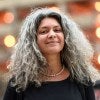Investing in Communities Through Public Health
 Play Video
Play Video
While access to healthcare is a human right, many individuals still face structural barriers to receiving care, says Council Emerging Leaders Program alum Yamilé Molina. "My work is really focused on, how do we address access while understanding and elevating community strengths."
Yamilé is an associate professor of Community Health Sciences at the University of Illinois Chicago, associate director at the University of Illinois Cancer Center, and associate director for community-engaged research at Mile Square Health Center.
"My public health work really has implications for improving the health of global citizens throughout the world. And also, I have a lot to learn from global successes in terms of bringing them back to where I work in Cook County."
For World Health Day, we spoke with Yamilé about their journey into healthcare, engaging with the power of patients, and the future of public health programming.
Interview Summary
This interview has been lightly edited for length and clarity.
Your work focuses on amplifying the voices and agency of marginalized communities. What are some of the key challenges these communities face in accessing healthcare? Growing up as a young person, every time I was told to talk about where I came from, every time I saw myself in history books or saw my family in history books and how they were discussed socially, the conversation was always around our barriers. There was not a lot of conversation around our assets, around the resources, around the opportunities that every one of our communities has.
Those personal experiences and self-reflection as I was going through my public health journey, offered me an opportunity to think through, what are ways in which science can recognize assets while recognizing system responsibility?
Your approach emphasizes individuals as messengers and interventionists. Can you explain how this works in practice and why it’s effective? My approach focuses on thinking about every client, every research participant, as not only the recipient of resources of interventions in public health, but also as the future resources of that public health programming. They are messengers as well as interventionists. If they have a great experience in the doctor's office, they will share that information. If they have a bad experience, they will also share that information.
And so, my public health practice focuses on, how do we identify and engage with the power of every one of our patients? How do we recognize their leadership potential and how they work in social networks and then work with them in terms of connecting them with resources that can amplify the positive experiences they have in healthcare settings?
The theme of this year’s World Health Day calls for prioritizing women’s long-term health. What systemic changes do you believe are needed to move beyond short-term interventions and support women’s well-being across their lifespan? There are a number of systemic challenges that need to be addressed to really move us beyond short-term interventions and to support women and other people across their lifespan. For example, challenges in terms of copayments, challenges in terms of overcoming medicines that are not immediately available because they require a number of clinical steps that are not necessarily efficient.
Beyond the work that I do, there are a number of key challenges that my colleagues in other disciplines focus on. For example, addressing those competing priorities that challenge people's ability to engage in health because they're focused on their family dynamics, because they're focused on employment, because they're focused on neighborhood dynamics. There's a number of investments and systemic investments that can be scaled to be as effective, and as cost effective, as possible.


